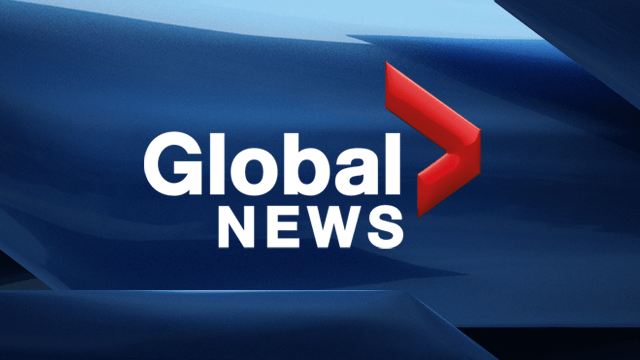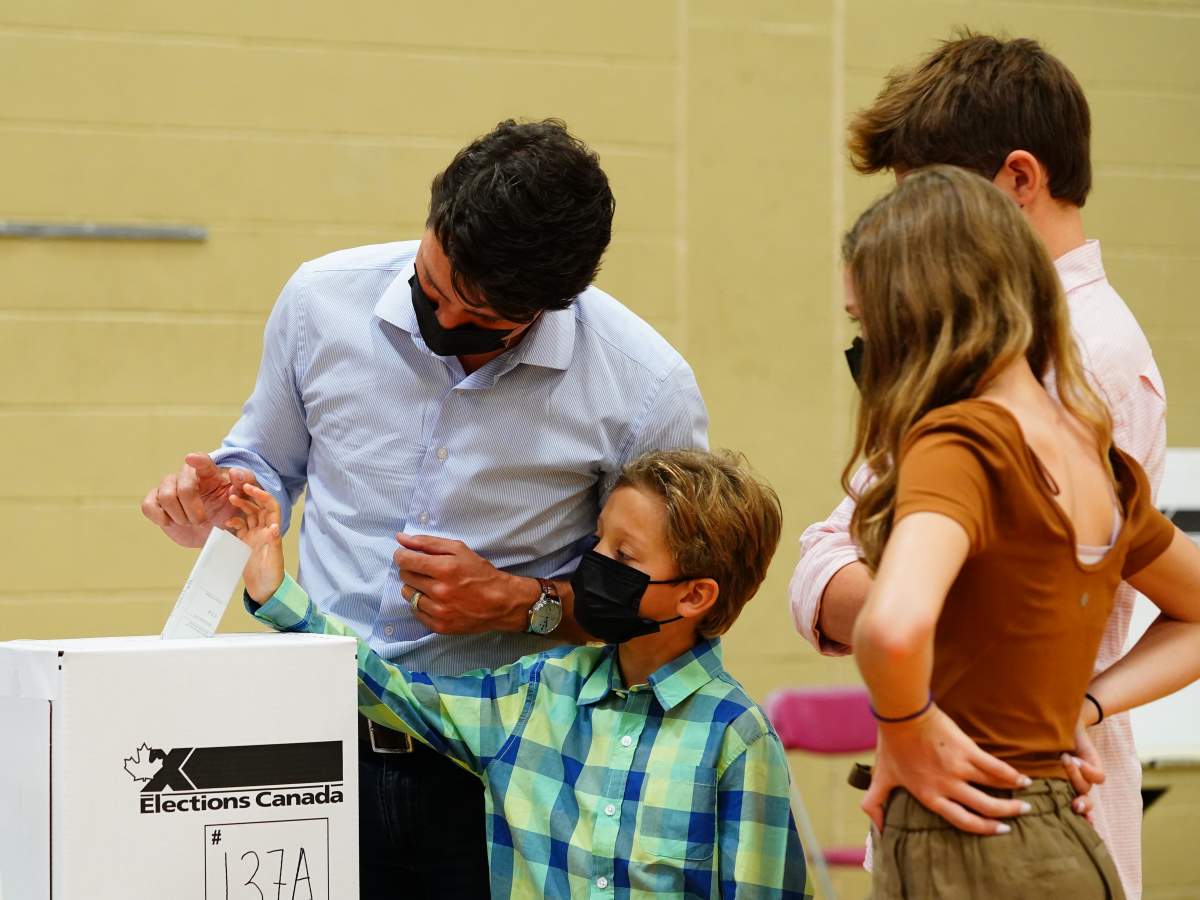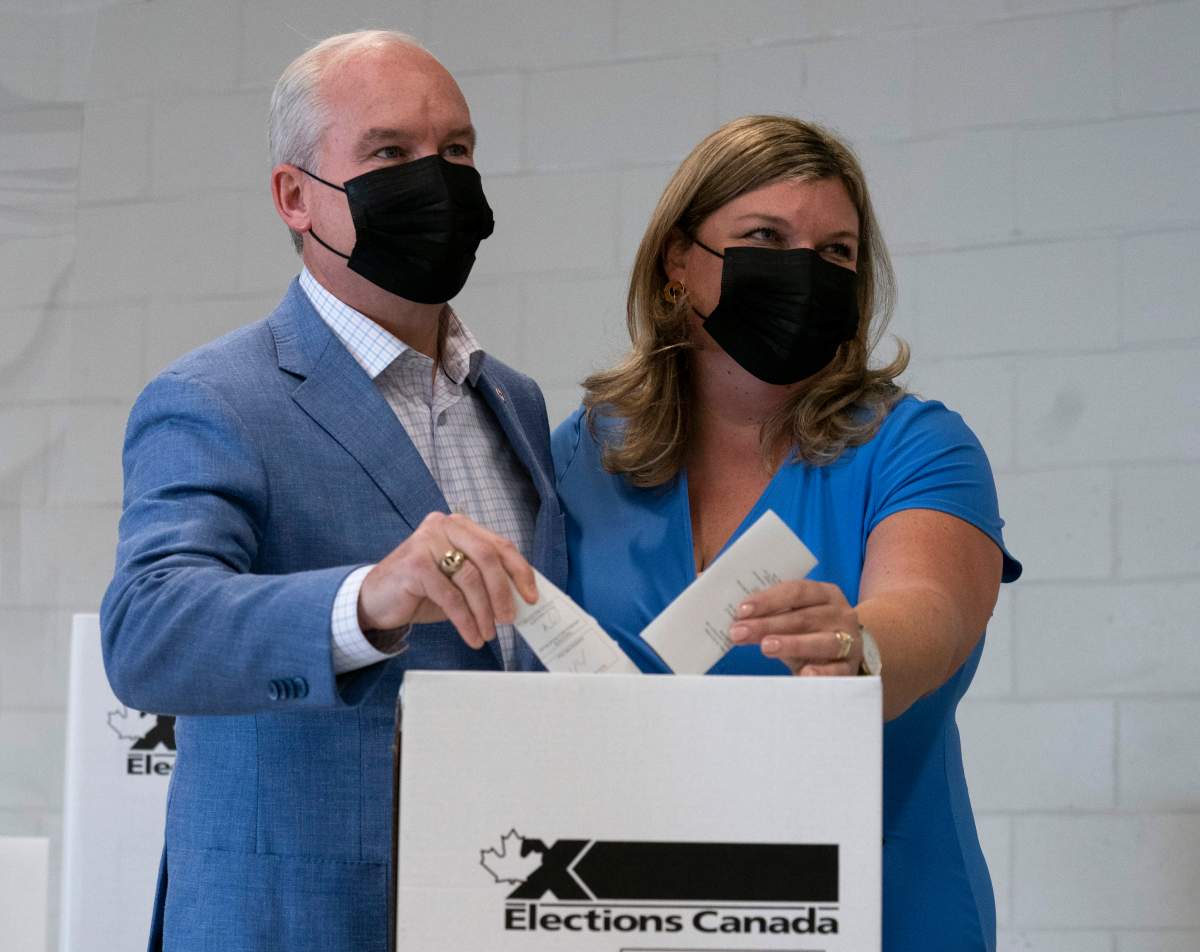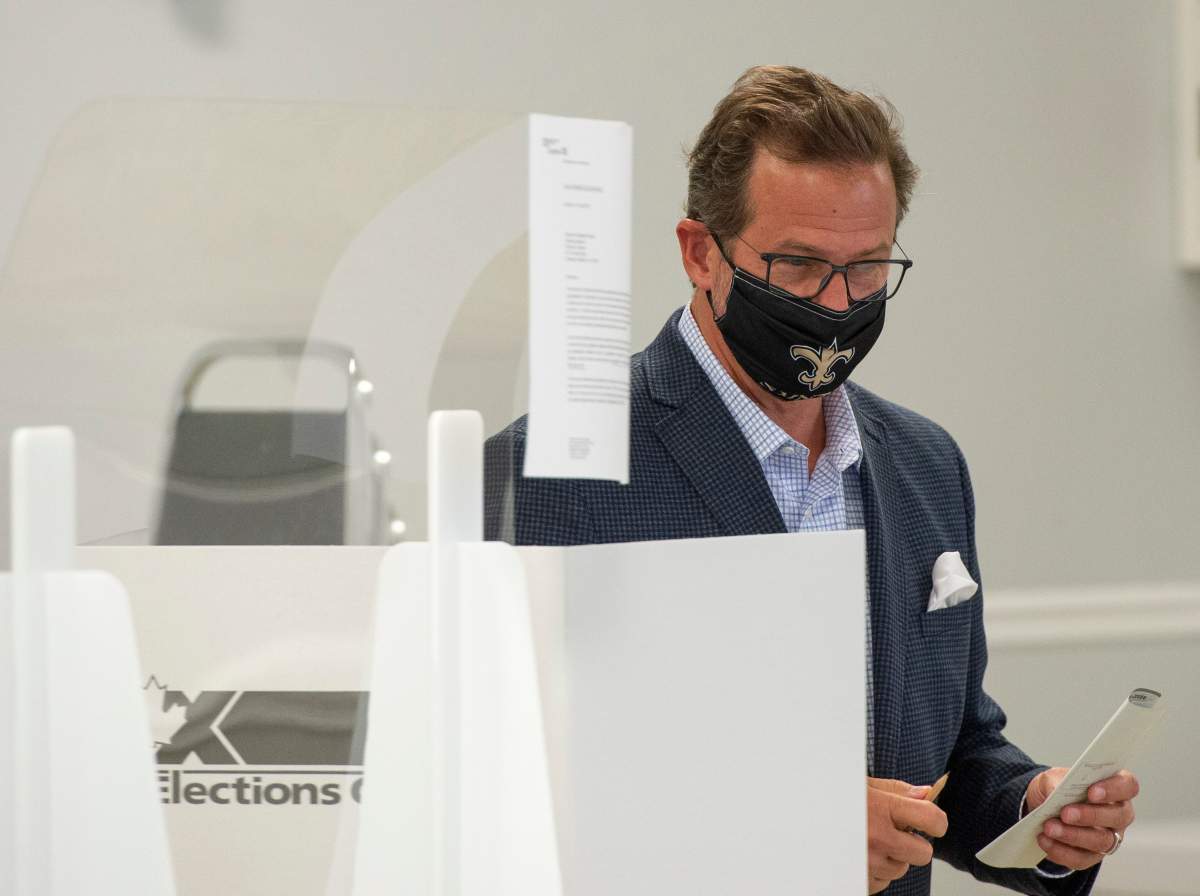UPDATE: 10:38 p.m. – Global News is projecting Justin Trudeau and the Liberals will form the next government of Canada.

Liberal Leader Justin Trudeau rolled the dice with his decision to call an election in the middle of the fourth wave of COVID-19 — and now, Canadian voters will decide whether his gamble pays off.
Polls across the country are now closed except to those already waiting in line. The pandemic election is the most expensive in Canadian history at an estimated $600 million, and speculation is rampant about whether voters will choose to keep restraints on whichever party they elect to govern with a potential minority.
A majority government remains the glittering prize all parties eye during campaigns, but last-minute polling released Sunday night raised questions on whether one will actually be possible.
Polls closed in B.C. at 10 p.m. ET and at 9:30 p.m. ET from Quebec right the way west to Alberta.
That means preliminary results will likely start to become clear very shortly, though it’s expected some races could be too close to call for several days due to large numbers of mail-in ballots that need to be counted starting Tuesday.
Early results had begun trickling in from Atlantic Canada shortly after 7:30 p.m. ET on Monday night.
There are signs the Liberals are poised to hang on to their commanding position in the four easternmost provinces, with prominent Liberal candidate and current cabinet minister Seamus O’Regan the first to be projected as winning his Newfoundland riding of St. John’s South-Mount Pearl.
Fellow cabinet colleague and veteran Liberal Dominic LeBlanc was also quickly projected as winning the New Brunswick riding of Beausejour, which he has represented for roughly 20 years.
Lawrence MacAuley, also a longtime Liberal and a cabinet minister, is projected to hold onto his Prince Edward Island riding of Cardigan as well.
Many races in the region, however, remain too close to call and there are reports of long lines coming in from some parts of the country, raising further questions about voter turnout and wait times.

Darrell Bricker, Ipsos Global Affairs CEO, told Global News on Sunday he expects Canadians will be in for “a very long night” as the country awaits results from a highly uncertain election.
“It’s incredibly hard to figure this election out. It’s the most difficult election I have seen to do polling on and figure out what Canadians are going to do since 2004,” he said in an interview on The West Block.
“So it could end up, I don’t think, being a majority for anybody, but we really don’t know who would form a minority government out of this.”
- Alberta budget 2026 comes with spending hikes but $9.4B deficit
- Poilievre calls Trump’s Canada attacks ‘wrong,’ urges U.S. trade stability
- Liberals survive confidence vote as House passes budget implementation bill
- Liberal, Bloc Québécois rematch in Terrebonne riding after Supreme Court nixes result
Speaking on Monday night as part of Global’s Decision Canada special election coverage, Bricker pointed to election day polling by Ipsos for Global News, which asked 10,000 Canadians about their voting decisions after they cast their ballots.
“What we’re finding is about 17 per cent of the people who voted today did not feel good about their vote. They probably voted for a party to stop somebody else,” Bricker explained.
“Only about four per cent of the people made their choice today – last time around, it was double that.”
The key number for any party to be able to form a majority government is 170 — that’s just over half of the 338 seats up for grabs in the House of Commons.
Liberals held 155 seats at the end of the last Parliament, while the Conservatives held 119.

Get daily National news
The rest were divided between the NDP, Bloc Québécois, Green Party and Independent MPs.

Trudeau asked Gov. Gen. Mary May Simon to dissolve Parliament on Aug. 15, sending Canadians to the ballot box two years before a mandated election on Oct. 16, 2023, and prompting a wave of criticism from the political opponents who argued his sole focus should be on governing.
In response, Trudeau has defended his decision and said an election was necessary for Canadians to choose how they “want to end” the pandemic with the government they choose.
Throughout the campaign, party leaders have made promises on Canada’s pandemic response, the economy, affordability, child care, climate change, spending, Indigenous reconciliation, taxes and housing.
On the eve of election day, party leaders made last-minute appeals in whirlwind tours of swing ridings in an effort to convince voters to choose them.

About 6.8 million Canadians have already voted, majority of them doing so through advanced polling Sept. 10 to 13, and the rest through special balloting either by mail or in-person at Elections Canada offices. Millions of others were eligible to vote on Monday.
Election day voting hours were staggered throughout the day with the goal of making it so the majority of results roll in around the same time across the country, according to Elections Canada.
Polls in Newfoundland and Atlantic time zones ran from 8:30 a.m. to 8:30 p.m., Eastern time from 9:30 a.m. to 9:30 p.m., Central time from 8:30 a.m. to 8:30 p.m., Saskatchewan and Mountain time from 7:30 a.m. to 7:30 p.m. and Pacific time from 7 a.m. to 7 p.m.

Elections Canada is encouraging voters to wear masks, but only requires them in provinces where they are mandated. Proof-of-vaccination rules don’t apply at voting stations in any province where they currently exist.
Most riding winners will be decided by the end of Monday, but Elections Canada has also warned it might take up to four days to finish counting the special ballots, meaning some close races won’t have official winners for several days.
With millions of Canadians heading out to vote, there have been some reports of long lines and disturbances at polling stations. In Toronto, several lines were spotted at voting locations.
In Edmonton, police were called to break up a disturbance at a polling station where two people reportedly refused to wear masks inside.
A police spokesperson said a man and a woman got into a dispute with election workers after refusing to wear their masks due to an alleged medical exemption.
Party leaders are among the millions of eligible Canadians heading out to vote Monday. Alongside his family, Liberal Leader Justin Trudeau voted in his riding of Papineau in Montreal.
Meanwhile his main rival, Conservative Leader Erin O’Toole, was in Bowmanville, Ont. with his wife Rebecca O’Toole to cast their ballots.
NDP Leader Jagmeet Singh and Bloc Québécois Leader Yves-François Blanchet both voted earlier in the campaign, choosing to do so during advanced polling.
Green Party of Canada Leader Annamie Paul voted by mail earlier in the campaign, but tweeted Monday she was in Toronto Centre, the riding she’s running in.
As polls begin to close across the country, Global News will have live, real-time election results for all 338 ridings, starting with results in Newfoundland and Labrador.
— with files from The Canadian Press













Comments
Want to discuss? Please read our Commenting Policy first.